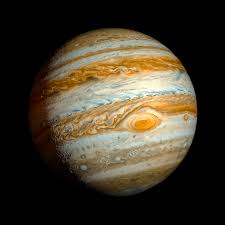Planet: Jupiter
1: - Jupiter's moon, Ganymede, is the largest moon in our solar system, larger than the planet Mercury, and is the first known moon that has its own magnetic field.
2: - The Sun contains more than 99.8 percent of the total material (mass) in our solar system, while Jupiter contains most of the rest.
3: - Jupiter rotates in less than 10 hours, which means that the planet's surface moves at almost 50,000 km / h.
4: - Comet Shoemaker-Levy 9 crashed into Jupiter in July 1994, with the biggest accident ever seen.
5: - When Jupiter was formed it was much hotter and twice the size it is now, it continues to decrease at a speed of 2 centimeters per year due to heat radiation.
6: - Jupiter's core is not metallic, but due to the immense pressure inside Jupiter, the core has become a metal. This metal is liquid metallic hydrogen.
7: Jupiter has 2.5 times the mass of all the other planets in the solar system combined, and it would take more than 11 Lands together to cross its diameter.
8: - It is believed that one of Jupiter's moons grows and contracts due to the water beneath its frozen surface.
9: - A new and small moon of Jupiter revolves around the planet in just over 7 hours, which makes it the fastest moon in the solar system.
10: - Jupiter is so massive that it also controls its own mini solar system. It has twenty-eight moons in its gravitational slavery, four of which coincide with the planet Mercury.
11: - Jupiter's moon, Europe, is completely covered with ice.
12: - Jupiter is heavier than all the other planets together.
13: - The heat inside the vents of the volcano on the moon of Jupiter can be 1/3 of the surface temperature of the Sun.
14: - The largest in the solar system is the magnetosphere of Jupiter, it extends from the poles of Jupiter to Saturn.
15: - If the planet Jupiter had been 80 times more massive, a star would have formed.
16: - The moon of Jupiter Io has "terrestrial tides", of the gravitational attraction of the gas giant. The land of Io actually rises falls to 100 meters, just as it cracks and separates when Jupiter pulls it.
17: - If the Sun were the size of a beach ball, then Jupiter would be the size of a golf ball and Earth would be as small as a pea.
18: - Jupiter acts as a great vacuum, attracting and absorbing comets and meteorites. Some estimates say that without the gravitational influence of Jupiter, the number of massive projectiles hitting the Earth would be 10,000 times greater.
19: - The gravity in Jupiter is 2.6 times that of the Earth.
20: - Jupiter's huge magnetic field is 14 times stronger than Earth's and has 20,000 times more energy.

Comments
Post a Comment